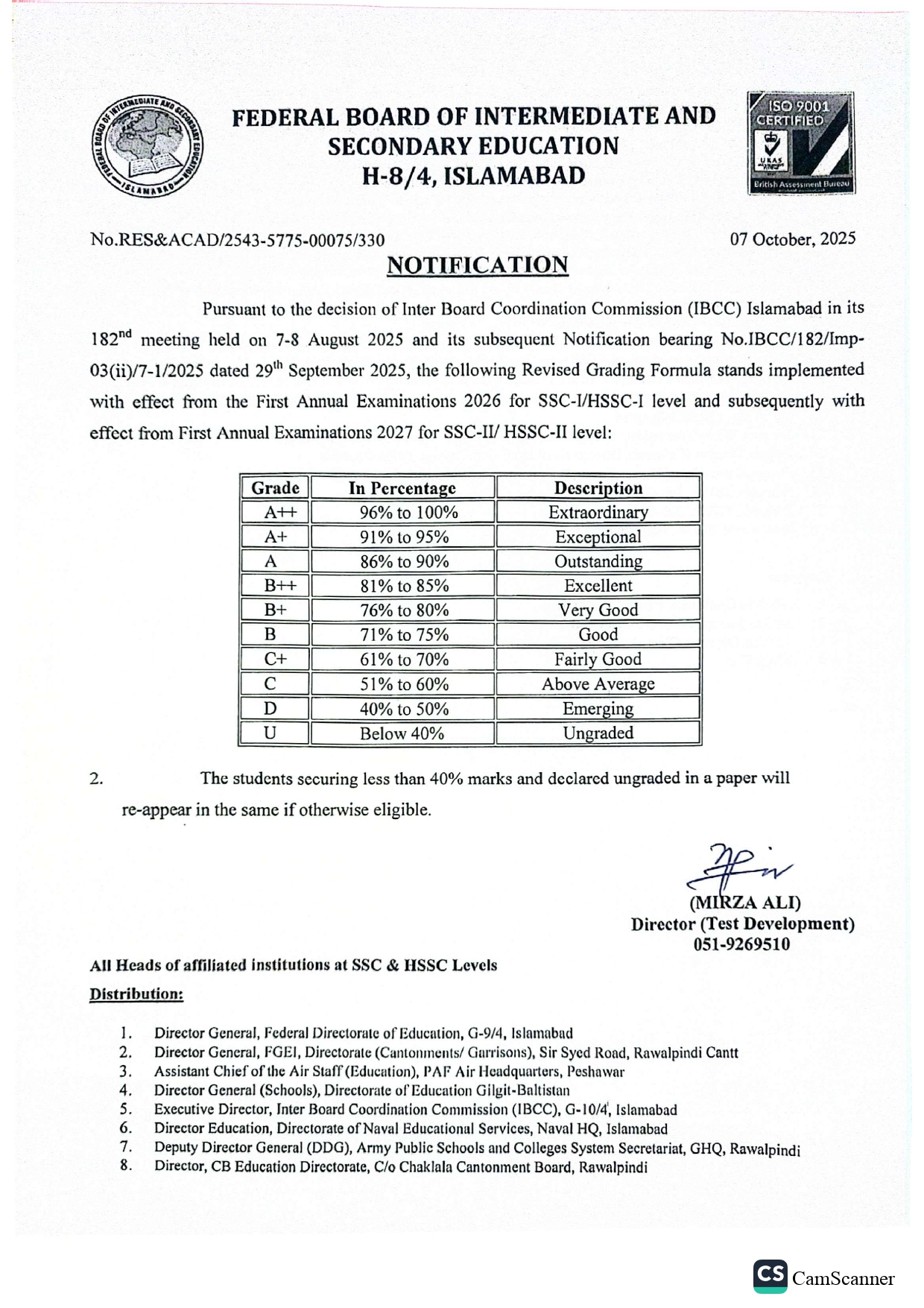
New Minimum Passing Marks Announced by Federal Board
The Federal Board of Intermediate and Secondary Education (FBISE) has officially announced a major change in its examination policy, increasing the minimum passing marks for all subjects from 33 percent to 40 percent. This significant reform will take effect from the Annual Examinations 2026 for both Secondary School Certificate (SSC-I) and Higher Secondary School Certificate (HSSC-I) levels.
According to the official notification, the decision was made after comprehensive consultation with the Inter-Board Coordination Commission (IBCC), which reviewed grading and assessment criteria across all educational boards in Pakistan. The move aims to enhance the quality of education, ensure better academic standards, and bring Pakistani evaluation methods in line with international education systems.
New Minimum Passing Marks Policy Overview
Under the new policy, students appearing in FBISE exams in 2026 will be required to score at least 40% in each subject to be declared as “pass.” This new rule replaces the long-standing 33% passing benchmark, which had been in place for decades.
An FBISE spokesperson stated that this change reflects the Board’s commitment to improving educational outcomes and strengthening academic discipline among students. The decision was not taken abruptly — it followed months of analysis, feedback from academic experts, and alignment with modern educational practices.
“Raising the passing marks is part of a broader strategy to enhance students’ conceptual understanding rather than just rote learning,” said an official from FBISE. “It will push students to focus more on comprehension and application of knowledge rather than relying solely on memorization.”
Implementation Timeline
The new 40% passing criterion will apply initially to SSC-I (Class 9) and HSSC-I (Class 11) students appearing in the First Annual Examinations 2026. Subsequently, it will extend to SSC-II (Class 10) and HSSC-II (Class 12) from the Annual Examinations 2027.
This phased implementation ensures that students and educational institutions have sufficient time to adapt to the revised assessment policy. Teachers have also been instructed to modify their evaluation strategies and help students meet the higher academic standards.

Reason Behind the Change
The Federal Board’s decision to revise the minimum passing marks was primarily driven by the need to improve academic performance and increase competitiveness among students.
Educational experts have long debated that the 33% threshold sets a low bar for academic achievement, allowing students to pass even with minimal understanding of the subject. By increasing the passing percentage to 40%, the FBISE aims to encourage a stronger grasp of concepts, promote critical thinking, and prepare students for higher education challenges.
Furthermore, the decision aligns Pakistan’s education system with global academic standards, where passing thresholds are generally set between 40% and 50%. The IBCC, in its recommendations, emphasized that standardizing the evaluation system across boards would help maintain uniformity and credibility in student assessment nationwide.
Impact on Students and Schools
The announcement has generated mixed reactions from students, parents, and educators. While many welcomed the change as a positive step towards improving educational quality, some expressed concerns about the potential increase in academic pressure on students.
Teachers believe the decision will encourage students to work harder and focus more on learning rather than depending on minimum marks to get by. Educational institutions affiliated with FBISE are now preparing to adjust their teaching methods, classroom assessments, and internal marking schemes to help students achieve the new benchmark.
Private schools under FBISE jurisdiction have also started conducting awareness sessions for parents and students, ensuring that they understand the implications of the new rule well before the 2026 exams.
“This reform is not meant to make exams harder; it’s about motivating students to reach their full potential,” said a senior principal of an FBISE-affiliated school in Islamabad. “It’s an opportunity for students to strengthen their fundamentals and perform better in higher education and competitive exams.”
Connection with FBISE’s New 10-Point Grading System
The change in passing marks comes shortly after the Federal Board’s announcement of a new 10-point grading system, also set to take effect from 2026. Together, these reforms mark a comprehensive overhaul of FBISE’s evaluation system.
The new grading framework is designed to provide a more accurate reflection of a student’s performance and reduce the stress associated with traditional percentage-based evaluation. The increased passing percentage complements this system, ensuring that grades accurately represent students’ learning outcomes.
Reactions from Educational Experts
Education analysts have lauded FBISE’s move as a step toward academic excellence. According to them, the reform will not only improve learning quality but also enhance the credibility of Pakistani qualifications in the international academic arena.
Dr. Saima Qureshi, an education policy researcher, commented that such measures are essential to bring Pakistani secondary and higher secondary education at par with international standards.
“The 40% minimum passing marks reflect a shift toward global best practices. It will help raise the academic bar, making Pakistani students more competent in higher education institutions worldwide,” she noted.
The decision by the Federal Board of Intermediate and Secondary Education (FBISE) to raise the minimum passing marks from 33% to 40% represents a bold step toward educational improvement and standardization. By implementing this policy starting in 2026, the board aims to promote stronger academic performance, encourage deeper understanding, and enhance the overall quality of education.
While the transition may pose short-term challenges for students and schools, the long-term benefits — including improved learning outcomes, international recognition, and a more competitive student body — make it a progressive and necessary reform.
With the introduction of the 10-point grading system and now the 40% passing mark policy, the FBISE is clearly committed to transforming the examination system into one that rewards knowledge, effort, and excellence.















